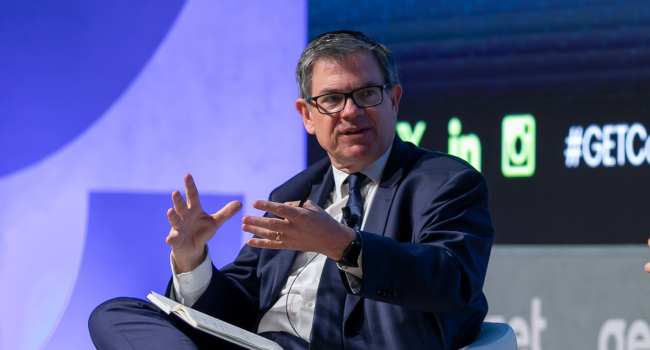Insight from GET leadership roundtable 2: Citizen and community empowerment for a people-led energy transition. The session was moderated by Ed Crooks, Vice Chair, Americas, Wood Mackenzie.
The starting point for the discussion was the question of whether citizen and community empowerment could delay the transition to low-carbon energy and prevent an effective response to the climate crisis.
The Paris Agreement includes a commitment to respect human rights, local communities, indigenous peoples, children and others in vulnerable situations. Closures of coal-fired power plants in areas of high unemployment, cuts to fossil fuel subsidies, and mine construction to extract critical minerals, to take just a few examples, are actions that could help put global greenhouse gas emissions on a more sustainable path, while having adverse impacts on local communities.
Empowered citizens and communities can obstruct those changes through political and legal action. Some argue that the combined effect of those actions will be to prevent the adoption of low-carbon technologies at the speed and scale that is needed to meet the Paris goals.
However, the strong consensus of the roundtable group was that the energy transition can succeed only if citizens and communities are empowered, and businesses and policymakers engage with them to make sure they buy into the changes that are being made. Without that buy-in from customers, employees, local communities and the general public, policies and business models intended to reduce emissions will not durable over time.
A comment by Tony Blair, the former UK prime minister, was discussed. He said in a plenary session that the movement for climate action needed to shift away from campaigners and towards policymakers. The roundtable suggested that, although there might be some truth in that statement, the impression that responsibility was moving from civil society to a technocratic elite would ultimately be counter-productive for the effort to address climate change.
Beyond that general agreement, the group discussed some of the challenges for getting buy-in from citizens, and some of the strategies for securing it. Key points from the discussion were:
- Early and effective engagement is crucial for any potentially disruptive investment project or policy change. Policymakers and business leaders need to understand the impact of their decisions, and the roots of the opposition they may face. And they need to find ways to bring people onside with the changes they are making. Examples were cited of developers that were able to complete infrastructure projects successfully thanks to effective engagement with local communities. Spending more and taking longer on engagement up-front at the beginning of a project can pay off in faster construction and lower development costs overall.
- Communication is key. Governments and businesses need to talk clearly to citizens about what they are doing and why, and listen to what citizens say to them. Still too often decisions are handed down without clear and coherent explanations, and without taking into account the concerns raised by opponents.
- …But communication has to align with reality. The slickest communications strategy in the world will not help if the messaging conflicts with the reality of the actions being taken. The EU’s corporate sustainability due diligence directive, which came into force on 25 July 2024, was cited as an example of a measure that will force companies to identify and address human rights and environmental impacts in their operations and value chains, rather than just paying lip service to those issues.
There was some debate over politicians’ messaging around the need for climate action. It was noted that talk of a “climate crisis” could move some people away from support for cutting emissions. News stories that imply that catastrophic outcomes are likely can also undermine support for climate action. It was observed that alarming predictions for climate impacts, which are not borne out by events, can undermine the credibility of advocates for emissions reduction. - Innovation in engagement can pay big dividends. There was general interest in the example of Octopus Energy’s “Fan Club”, which offers customers discounts on their electricity when their local wind turbine is generating. It was seen as an imaginative and effective way to engage the public with the benefits of wind power in general and local turbines in particular. Another example cited was social pressure for energy conservation in Greece. The region has been hit by blackouts as the grid comes under strain in high temperatures, but some consumers are aware of the need to limit power consumption and restrict their use of air-conditioning.
- Different countries and regions have different interests and objectives. There was a general recognition that regions that are in energy poverty or on low incomes will have more urgent priorities than tackling climate change. Low-income countries in Africa, for example, are responsible for only a tiny proportion of global greenhouse gas emissions, and use energy at per capita rates that are far below consumption in North America and Europe. And economic development is one of their most effect routes for adapting to the impacts of global warming. As one participant put it: the Global South does not care about cutting emissions.
In those regions, the transition to low-carbon energy will have to be based on co-benefits: increased access, lower costs, more secure supplies, less local pollution. There are many examples of how that can be made to work, for example in clean cooking stoves replacing wood and dung, or distributed solar bringing power to rural areas for the first time, but cutting greenhouse gas emissions is not enough. There are lessons that can be drawn from this for high and middle-income countries, as well.
It was suggested that over the past two or three years, some of the momentum has ebbed away from the energy transition. The surge in global inflation that followed the Covid pandemic, and Russia’s invasion of Ukraine in 2022, have raised affordability and reliability to the forefront of concerns about energy, at the expense of sustainability. There was broad agreement among the participants that the energy transition is still under way. But it will need increased efforts and innovation in public engagement to secure broad and lasting support for a low-carbon future.
Register your interest in GET Congress & Exhibition 2025 here: https://www.getcongress.com/forms/register-your-interest-2025/

Roundtable Participants:
- Honourable Katarzyna Piquette, Associate Deputy Minister – Intergovernmental Relations, Government of Alberta, Canada
- Stephanie Collins, Senior Associate, Gibson Dunn
- Mike Haigh, Chair – Infrastructure Industries Governors Group, World Economic Forum and formerly CEO, Mott MacDonald
- Vikas Chhajer, Chief Sustainability and Strategy Officer, Geminicorp
- Lucy Yu, CEO, Centre for Net Zero
- Craig Hicks Jr., Global Head of Sustainability, VP of Investor Relations & ESG, Excelerate Energy
- Emma Scott, VP – Sustainability, Kent
- Andrew Purvis, Director, World Steel Association
- Isabel Miranda, Director of Social Performance and Sustainability, Ipieca
- Nevin Alija, Head of European Affairs, Floene
- Valentina Dedi, Associate Director, Economics, KBR


